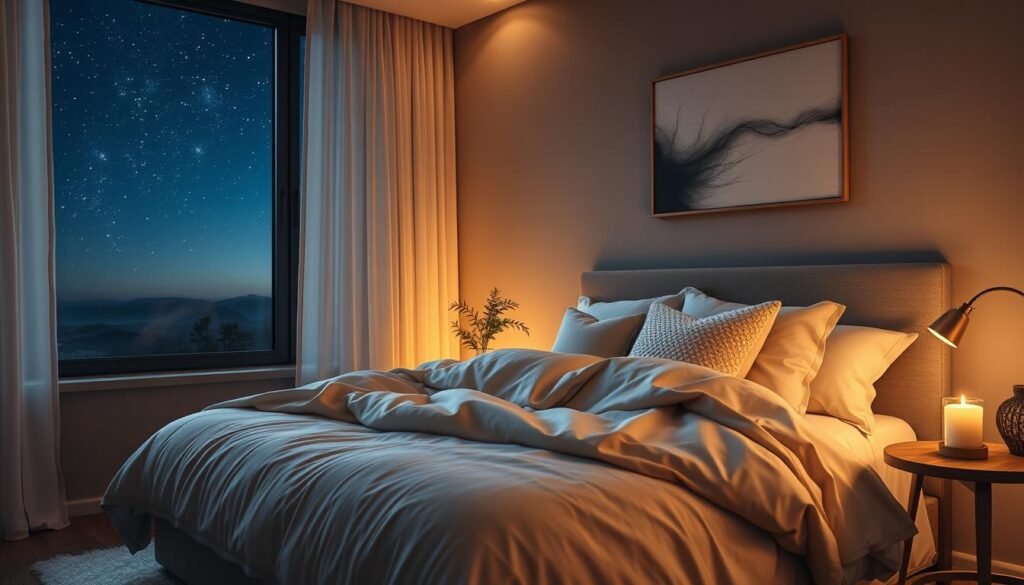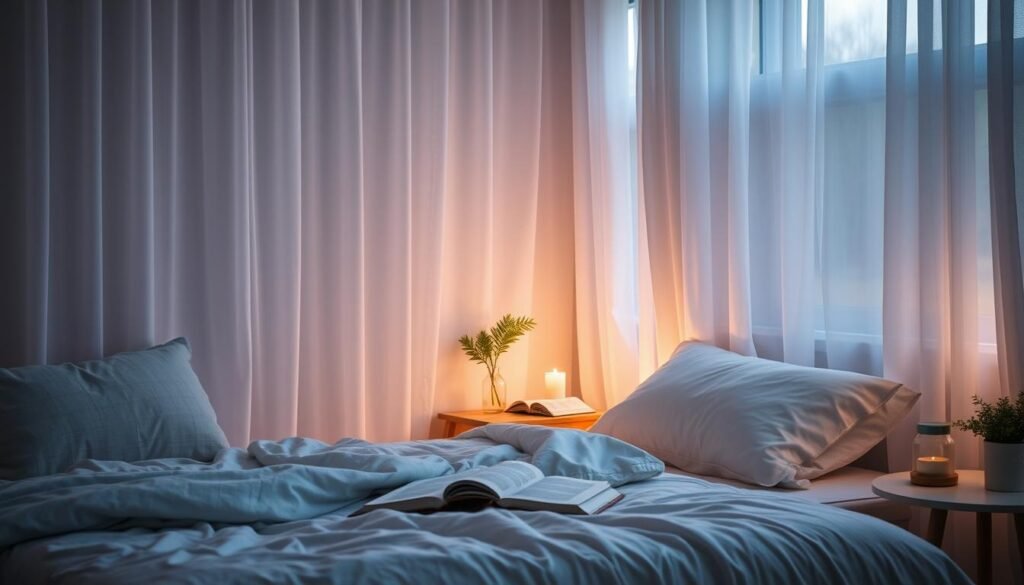Did you know insomnia affects a big part of our lives? At least one-third of us have trouble sleeping. Those with chronic insomnia struggle three times a week for more than three months. This shows how common sleep issues really are.
Not getting enough sleep doesn’t just make us tired. It can lead to serious health problems. These include heart disease, diabetes, and even cancer. The quest for better sleep is critical. It’s a challenge lots of folks face daily.
If finding peace at night seems hard, don’t worry. This article has tips and advice to help you sleep better. Improving your sleep can boost your overall health and happiness.
Key Takeaways
- Chronic insomnia impacts millions, with one-third of the population affected.
- Sleep deprivation is linked to serious health risks, including heart disease and obesity.
- Reading in bed has been shown to improve sleep quality significantly.
- Practicing controlled breathing techniques for 12-30 minutes can enhance sleep.
- Herbal teas like chamomile and lavender are effective natural sleep aids.
- Consulting a healthcare professional is advisable for chronic insomnia for personalized strategies.
- Avoiding screens before bedtime can help regulate healthy sleep patterns.
Understanding Insomnia and Sleepless Nights
Insomnia isn’t just trouble falling asleep now and then. It means having a hard time falling or staying asleep often, leading to poor sleep quality and unrest. Many people have sleep disturbances for a short period, but for some, insomnia can last longer and really affect their daily life and health.
What is Insomnia?
Insomnia comes in different types. There’s acute insomnia, which is short and usually due to stress, lasting days or weeks. And then there’s chronic insomnia, which is when you have trouble sleeping at least three nights a week for over three months. Things like stress, changing sleep habits, health problems, and some medicines can cause lack of sleep. As people get older, they might get insomnia more often because of changes in sleep habits and health issues.
Common Symptoms of Sleepless Nights
Insomnia can make life harder in many ways. People with insomnia often have problems like:
- Difficulty falling asleep at night
- Frequent awakenings during the night
- Waking up too early in the morning
- Feeling tired or sleepy during the day
- Getting easily irritated or mood swings
- Having trouble focusing
Noticing these issues is important for solving sleep problems and getting the right help. If your sleep is often bad, you should look into why and find ways to sleep better.
| Type of Insomnia | Duration | Common Causes |
|---|---|---|
| Acute Insomnia | Short-term (days or weeks) | Stressful events, changes in routine |
| Chronic Insomnia | Long-term (3+ months) | Medical conditions, mental health disorders, chronic pain |
Knowing about insomnia and its effects can help people take steps to sleep better. It’s about finding help when needed and making lifestyle changes that promote good sleep.
Causes of Interrupted Sleep Patterns
To understand why you can’t sleep, you must know the main causes. These include emotional issues, physical problems, and your daily habits. Working on these can help you sleep better.
Emotional Triggers: Anxiety and Stress
Feeling anxious or stressed can keep you awake at night. These feelings make your thoughts race, stopping you from relaxing. It’s important to deal with these emotions to sleep better.
Physical Factors: Medical Conditions
Some health problems can make it hard to sleep well. Issues like restless legs, sleep apnea, and chronic pain are common culprits. Menopause can also disrupt sleep. Getting medical help for these can improve your sleep.
Lifestyle Habits: Caffeine and Alcohol Consumption
What you consume affects your sleep. Drinking too much caffeine or alcohol can ruin your sleep quality. Avoiding these, especially before bed, can help you sleep uninterrupted.
| Factor | Impact on Sleep |
|---|---|
| Emotional Triggers | Increases anxiety, leading to difficulty falling and staying asleep |
| Medical Conditions | Disrupts sleep continuity; may require medical intervention |
| Caffeine Consumption | Interferes with the body’s ability to relax and fall asleep |
| Alcohol Consumption | Leads to fragmented sleep; disrupts REM sleep |
Effective Strategies to Combat Sleepless Nights
Fighting sleepless nights can make you feel better overall. Using relaxation methods can help you sleep better and rest more. Techniques like deep breathing and muscle relaxation make your mind calm and get your body ready for sleep.
Controlled Breathing Techniques
Controlled breathing uses slow breaths in and out to relax your nerves. Doing these exercises often can help stop sleepless nights. Try the 4-7-8 method: breathe in for four seconds, hold it for seven, and exhale for eight. Doing this for 20 to 25 minutes a day can improve your sleep.
Progressive Muscle Relaxation
Progressive muscle relaxation (PMR) makes you tense and then relax your muscles to ease tension. It helps you sleep better by lowering stress hormones. Start with your toes and go up to your head, letting go of stress. Adding PMR to your nighttime routine helps you relax naturally, leading to better sleep and fewer sleepless nights.

Creating the Ideal Sleep Environment
Creating the perfect sleep setting is key to rest well every night. It involves making the room dark and quiet. Also, setting the right temperature is crucial.
Importance of a Dark and Quiet Bedroom
A dark room is vital for good sleep. Light stops melatonin, which helps us sleep, from being made. Using blackout curtains helps lessen light. Also, a quiet room is important for deep sleep. Noises can wake you up often during the night. To keep it quiet, try soundproofing or a white noise machine.
Optimal Temperature Settings for Sleep
The right temperature is important for good sleep. Experts say to keep the room between 60 to 67 degrees Fahrenheit. Especially, 65 degrees Fahrenheit is good for sleeping well. A cooler room helps you sleep deeper. Also, choose comfy bedding that feels good to sleep on.
| Sleep Environment Factor | Recommended Setting | Impact on Sleep Quality |
|---|---|---|
| Light Levels | Completely dark (blackout curtains) | Enhances melatonin production, reduces awakenings |
| Noise Levels | Quiet (sound machines, white noise) | Increases deep sleep duration |
| Temperature | 60-67°F (ideal at 65°F) | Facilitates deeper sleep cycles |
| Bedding Comfort | Soft and supportive (quality mattress/pillows) | Promotes overall comfort and restfulness |

Developing a Relaxing Bedtime Routine
Having a calming bedtime routine tells your body it’s time to slow down. Gentle activities in the hour before sleep help your mind and body get ready for bed. Activities like reading and meditation make it easier to relax and fall asleep.
The Role of Reading and Gentle Activities
Reading a simple book helps you unwind. The soft light of a lamp and a quiet place can help you let go of stress. Other gentle activities, including yoga or deep breathing, also ease tension.
They make you feel more relaxed before bedtime. Meditation techniques help, too. They can improve your sleep quality by calming your mind.
Avoiding Screens Before Bedtime
It’s crucial to stay away from screens an hour before bed. Blue light from devices can lower melatonin, making sleep harder to come by. Shift away from phones and TVs to ready yourself for sleep without tech.
This helps your body prepare for rest. Without technology, your body can follow its natural sleep patterns more easily.

Creating a relaxing bedtime routine can greatly improve your sleep and overall health. With calm rituals and the right setting, you’re more likely to have a good night’s sleep.
Addressing Poor Sleep Quality through Lifestyle Changes
Improving sleep quality often needs some lifestyle tweaks. One key step is to have a steady sleep schedule. This helps your body’s clock stay on track. Aim to sleep at least seven hours each night for your health. Having a regular routine makes it easier to fall asleep and wake up at the same time every day. This change improves sleep quality over time.
Maintaining a Consistent Sleep Schedule
Having a regular sleep schedule is good for better sleep. If you go to bed and wake up at the same times, your body adjusts to day and night. Research shows this habit can make your sleep better in the long run. For those finding it hard to sleep, sticking to a consistent sleep schedule could help create healthier sleep patterns.
Limiting Daytime Naps
Long daytime naps can mess up night sleep. Experts say to keep naps under one hour and earlier in the day if needed. This way, you’ll likely find it easier to sleep at night. Cutting down nap time can greatly improve your sleep quality. Even though we sometimes can’t sleep, these habits help us sleep better. To find more sleep tips, check out effective relaxation techniques.
Using Natural Remedies to Promote Restful Sleep
Exploring natural remedies can be a game-changer for those with sleep troubles. Herbal teas and melatonin supplements are great options. They avoid the side effects that often come with traditional medications. This way, you can improve your sleep quality naturally.
Herbal Teas: Chamomile and Lavender
Herbal teas are cherished for making us feel calm. Chamomile tea, for instance, soothes our nerves and loosens tight muscles. It’s perfect for drinking in the evening, helping you unwind before sleep.
Lavender tea is another excellent choice for relaxation. Its scent alone can act as aromatherapy, aiding in better sleep. Although promising, we still need more research to confirm their benefits against insomnia fully.
Melatonin Supplements Guide
Melatonin is getting popular for sleep support. It’s especially useful for older folks with insomnia. Even a tiny amount, like 0.1 to 0.3 milligrams, can work wonders.
Fast-release melatonin works quickly, but be mindful of side effects like sleepiness during the day, headaches, and dizziness. Always talk to a doctor before starting on melatonin. They can help figure out the right dose for you.
Trying natural remedies such as herbal teas and melatonin can boost your sleep. They’re an excellent way to get better rest without the downsides of regular meds.
Understanding Sleep Disorders
Sleep disorders can really affect your life, causing issues like insomnia and stress during the day. Sleep apnea and restless legs syndrome (RLS) are common and can mess with your sleep. Sleep apnea means you stop breathing many times while sleeping. This can make you very sleepy during the day. If not treated, it can lead to serious problems like high blood pressure and even heart risks.
RLS makes your legs feel very uncomfortable, making you feel like you have to move them. This can make it hard to get a good night’s sleep.
Common Sleep Disorders: Sleep Apnea and RLS
Knowing the signs of sleep disorders is key to getting help early. Signs to watch for include snoring loudly, feeling very tired during the day, or feeling weird muscle sensations. If you notice these, talking to a doctor is crucial. There are many ways to treat these issues, like changing your lifestyle, therapy, and sometimes medication or special devices for sleep apnea.
When to Consult a Healthcare Professional
If you’re having ongoing sleep problems, it’s important to talk to a doctor. Long-term issues like not being able to stay asleep, having nightmares, or always feeling tired are signs to get checked out. Not dealing with these issues can lead to worse problems, like bad mental health outcomes such as anxiety or depression. Putting focus on good sleep and getting the right help can greatly improve your health. It shows how vital professional advice is for managing sleep well.